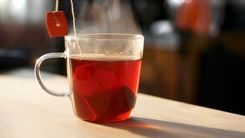The Benefits Of Drinking Hot Tea In Hot Weather
Unbranded
2 years ago

When temperatures soar and the sun blazes, the idea of sipping on a hot cup of tea might seem counterintuitive. However, this practice, embraced by various cultures around the world, can offer unexpected advantages in the scorching heat.
In the quest to beat the heat, individuals are constantly seeking innovative ways to stay cool. One unconventional method gaining attention is the consumption of hot tea on a hot day. This practice, although seemingly paradoxical, has proven benefits that contribute to cooling the body down.
Research indicates that drinking hot tea during summer can trigger a cooling effect on the body. Surprisingly, the heat from the tea encourages the body to sweat more profusely. This increase in sweat production facilitates the body's natural cooling mechanism, allowing it to regulate its temperature more efficiently. In contrast, cold beverages might provide temporary relief but lack the ability to stimulate the body's cooling response as effectively as hot tea does.
However, the efficacy of this approach is influenced by the type of climate one resides in. Individuals in regions characterized by dry heat tend to experience more pronounced cooling effects from hot tea consumption compared to those living in humid environments. The dry heat aids in the rapid evaporation of sweat, leading to more effective cooling.
As global temperatures continue to rise and heatwaves become more frequent, it becomes essential to prioritize methods that maintain a healthy body temperature and prevent heat-related illnesses. While staying hydrated remains a crucial aspect of managing the summer heat, embracing the practice of consuming hot tea can be an intriguing addition to one's cooling strategy, particularly in arid climates.
In a world where conventional practices are constantly challenged and reevaluated, the age-old custom of drinking hot tea in the summer showcases the unexpected ways in which our bodies respond to temperature changes. As we navigate the challenges of extreme weather, it's worth exploring the wisdom behind seemingly unconventional practices to discover the benefits they might hold.
Image Credit: Getty Images